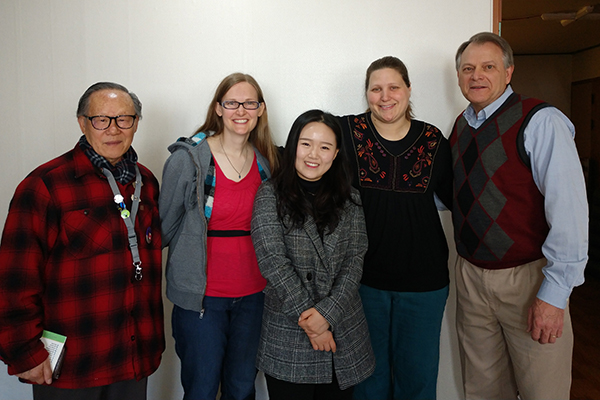Clarke Skelton, pastor of Valley Grande Baptist Church in Selma Baptist Association, smiled when he found that brand-new, nonstop flight from Atlanta to South Korea.
“That was nice,” he said. “They didn’t used to have that.”
That flight gave him a straight 15-hour shot when he headed there for the Winter Olympics in Pyeongchang, South Korea, in early February. It kept him from having to slalom across Europe and Asia for a whole day.
But it did something else, too. It carried him quickly right back into the heart of his family’s former home — and right into the spot where he had helped pilot Olympic ministry for Southern Baptists 30 years ago.
More Than Gold
“My wife Anita and I were missionaries in South Korea for 15 years, from 1985 to 2000,” Skelton said. And when the Summer Olympics came to Seoul, South Korea, in 1988, he helped pilot a Southern Baptist ministry that’s still used today — More Than Gold.
“The idea behind the ministry was that a relationship with Christ is better than a gold medal,” Skelton said.
Over the years, More Than Gold found its feet and has evolved into a variety of different ministries, said Marty Youngblood, who has helped to head up Southern Baptist Olympics ministry for the past 12 Olympic Games.
‘Hit its stride’
“It grew and really hit its stride in Atlanta in 1996, when the Olympics was in the North American Mission Board’s backyard,” said Youngblood, a state missionary in church and ministry relations with the Georgia Baptist Mission Board.
By that year, More Than Gold had capitalized on the pin-trading tradition at the Olympic Games and had a pin of its own that could be given away as a gift and used to share the gospel.
“We call them story pins,” Youngblood said. “We give them out as a gift to share the gospel and explain that life in Christ is more valuable than winning.”
Even though Skelton had helped to set the ministry in motion, this was his first time to be introduced to the pin.
And this year’s pin, which featured a woman in traditional Korean dress, opened the door for a lot of conversations, he said.
“The woman on the pin has traditional Korean fans in each of her hands, and the colors on the fan each represent part of the salvation story, Skelton said.
Black represents the sin that separates people from God. Red represents the blood of Jesus’ sacrifice to cover that sin.
Next, green represents new life, blue stands for heaven and gold represents how life in Christ is better than gold.
“In the 10 days I was there, we shared the plan of salvation more than 1,000 times,” Skelton said. “We saw more than 50 people make professions of faith.”
The “we” included Skelton and three other retired International Mission Board missionaries to Korea. It also included Youngblood, Georgia pastor and veteran Olympic minister Sid Hopkins and a team of several dozen Korean pastors and students.
Youngblood said the Holy Spirit’s work was evident there in the Olympic Park.
“Even though we had a smaller group than we usually do at the Olympics, it was one of our better experiences,” he said. “The team knit well together, and Clarke and those guys did an exceptional job.”
Skelton got “shoulder to shoulder” with the Korean student volunteers and helped them get comfortable sharing their faith, Youngblood said. “His expertise, wisdom and ability to communicate really deepened the work we were able to do at the Olympics.”
Great blessing
Skelton said it was a great blessing to be able to share not only with the Korean people but with people from all over the world.
“At least five of those professions of faith were people from Japan, which is almost unheard of,” he said, noting that
1 percent or less of Japanese people claim to be Christians.
Skelton and his team were based at the Olympic Park in Gangneung, the city that hosted all of this year’s ice events. It is about 30 miles from Pyeongchang, the mountain city that hosted the ski and snowboarding events and serves as the namesake for this year’s Olympics.
“We were able to plant a lot of seeds there,” Skelton said. “The longer we were there at the Olympic Park, the more easily conversations happened.”
The trip was also a sweet reunion and homecoming for Skelton.
“It was very much going home,” he said.
Skelton had only been back once since his family left in 2000, and it was a sentimental and spiritually significant time for him as he revisited the places they had lived, the people they had worked alongside and the neighbors and friends they had made.
“On the Sunday afternoon I was there, I got to preach in the city where my wife and I had lived for seven years,” he said. “I got to see old friends from 30 years ago. It was an amazing experience.”
Skelton said he believes the Holy Spirit definitely is at work in Asia, both through the Winter Olympics in Pyeongchang and in sowing seeds for Olympics still to come.
“The next Summer Olympics will be in Tokyo and then the next Winter Olympics will be in Beijing,” he said. “I believe that God was planting seeds among the Chinese and Japanese here in Pyeongchang that will be a base for Olympic ministry in the years to come.”






Share with others: